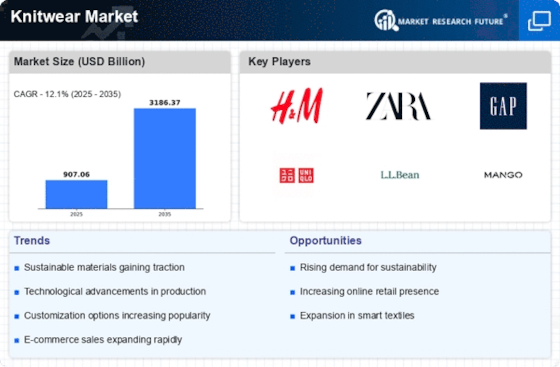Top Industry Leaders in the Knitwear Market

The knitwear market boasts a competitive landscape marked by key players such as H&M, Zara, Uniqlo, Gap Inc., and Fast Retailing. These industry leaders command significant market share, driven by their extensive product ranges, global brand recognition, and efficient supply chain networks. Strategies adopted by these players encompass rapid inventory turnover, responsive supply chain management, and competitive pricing strategies to maintain market dominance and expand their customer base.
Market share analysis in the knitwear sector is influenced by several critical factors. Brand loyalty, product quality, and the ability to offer a diverse range of knitwear styles significantly shape consumer preferences, impacting market share. Pricing strategies play a crucial role, with companies providing knitwear options at various price points to cater to a wide consumer spectrum. The establishment of strong partnerships with retailers and online platforms is essential for market share, ensuring widespread product accessibility and visibility.
While established players dominate the knitwear market, new and emerging companies are entering the fray with innovative approaches. These entrants often focus on sustainable materials, unique designs, and direct-to-consumer business models to carve out a niche. The agility of these emerging companies enables them to respond swiftly to changing fashion trends, challenging the market dominance of established brands and contributing to the overall dynamism of the market.
Industry news within the knitwear market frequently highlights evolving fashion trends, collaborations, and manufacturing innovations. Companies regularly introduce new knitwear designs, incorporating elements like sustainable materials and inclusive sizing. Collaborations with fashion influencers and designers are common to enhance brand visibility and connect with a broader audience. Shifts in manufacturing processes and the adoption of eco-friendly practices are notable industry trends, reflecting the growing consumer demand for sustainable and ethically produced knitwear.
Current trends in company investments within the knitwear market showcase a significant focus on sustainability and technology integration. Companies allocate resources to source sustainable materials, improve manufacturing processes, and adopt technologies that enhance efficiency and reduce environmental impact. Strategic marketing initiatives, including social media campaigns and collaborations with fashion influencers, are employed to strengthen brand presence and resonate with the target consumer demographic. Investments in e-commerce capabilities align with the growing preference for online shopping and contribute to market competitiveness.
The overall competitive scenario in the knitwear market remains dynamic, with companies navigating evolving fashion preferences and sustainability expectations. Established players face the challenge of maintaining brand relevance in a market where emerging companies are leveraging sustainability and technology to differentiate themselves. The competition is expected to intensify as new entrants gain recognition, introducing fresh designs and challenging the market share of established brands. In this environment, adaptability, responsiveness to fashion trends, and a commitment to sustainability will be crucial for companies to maintain and enhance their competitive positions in the knitwear market.
Industry News and Investment Landscape
- Fast fashion companies and sustainable suppliers have recently partnered, indicating an increasing emphasis on ethical sourcing and environmentally responsible production.
- A focus on the future is demonstrated by increased R&D expenditures, especially in the areas of improved knitting technology and sustainable materials.
- Direct-to-consumer business methods and smaller companies are presented with new prospects by the growth of online marketplaces and social commerce platforms.
Key Companies in The Knitwear Market Includes
- Adidas AG (Germany)
- Gildan Activewear Inc. (Canada)
- Loro Piana S.p.A. (Italy)
- Puma SE (Germany)
- Ralph Lauren Corporation (the USA)
- The Nautical Company (UK) Ltd
- Victoria's Secret (the USA)
- Maglificio Ripa S.p.a (Italy)
- LENZING AG (Austria)
- Ecowool (New Zealand)
- Sana Hastakala (P) Ltd. (Nepal)
- Gap Inc.











